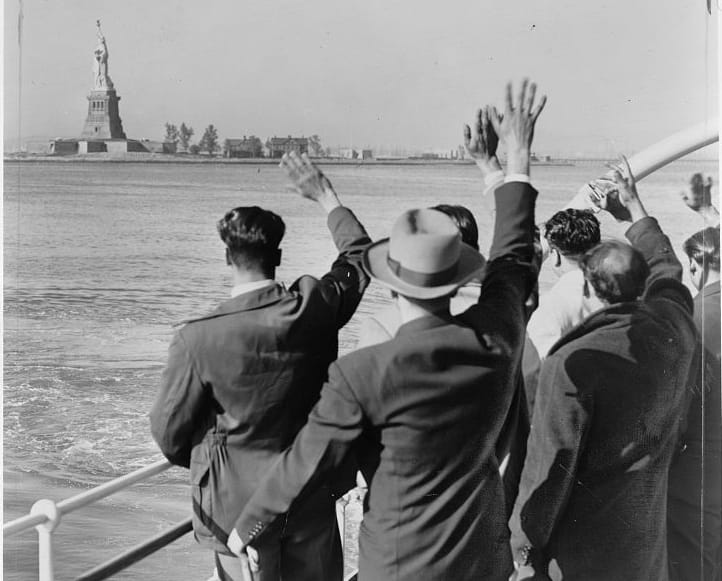Federalism and Mass Deportations: How Will Democratic Governors Respond?

Late last month, Denver's mayor, Mike Johnston, received lots of attention for claiming he's willing to go to jail to oppose any Trump-ordered mass deportations in his area. The reality is that only Democratic governors have real power at their disposal to oppose Trump's plan. The question is this: will they use it?
It's been not quite two weeks since Denver mayor Mike Johnston told Denverite how he and the people of Denver would respond to a Trump-directed mass deportation sweep operation in the city:
More than us having DPD stationed at the county line to keep them out, you would have 50,000 Denverites there. It’s like the Tiananmen Square moment with the rose and the gun, right? You’d have every one of those Highland moms who came out for the migrants. And you do not want to mess with them.

As the Guardian noted three days later, Johnston walked back the Tiananmen Square comparison but still pledged a willingness to be arrested by Immigration and Customs Enforcement (ICE) agents as a form of protest over any mass deportation operations in his city.
Johnston could certainly order the Denver Police Department to not only stay out of any ICE-run operations, but he could affirmatively direct them to refuse to provide support of any kind to such raids and round ups. He could direct city departments that deal with immigration-related issues to likewise refuse access to any computer databases containing the names, addresses, phone numbers, and the like of persons known to be or suspected of being here illegally.
But what if ICE agents come with federal warrants seeking such information?
Would Denver's police be instructed to prohibit ICE access to city government buildings containing such data?
Would ICE agents then arrest Denver police officers for obstruction?
Would the local U.S. Attorney file charges against not only Johnston but Denver's chief of police and other officers who impeded ICE?
Would local city officials who deal with immigration issues who refused to cooperate with ICE likewise be charged with obstruction by Trump's Justice Department?
How many people in the Denver city government would really be willing to risk potential federal prosecution to protect people with no lawful status in this country?
And as for civil society protests against ICE raids, does anybody really believe Trump and his Department of Homeland Security (DHS) appointees give a rip about such protests? Remember that Trump wanted to use military troops to shoot Black Lives Matter protesters in 2020.
The bottom line is that a single city or county in a given state is not going to be able to effectively prevent a federal mass deportation operation that will almost certainly ensnare people who were born here and are U.S. citizens, or those who were lawfully naturalized.
But a state governor with a legislature behind him might be another matter entirely.

Democratic Governor Jared Polis benefits from having a Colorado state legislature that is also under Democratic control. There's nothing preventing Polis from calling a special session of the legislature to pass an amendment to the state's emergency management statute declaring any federal mass deportation action to constitute a "disaster" or emergency requiring forceful action by the state to preclude death or bodily harm to any person residing in the state.
As it stands, Section 6 of that statute states, in relevant part, as follows:
(6) During the continuance of any state of disaster emergency, the governor is commander-in-chief of the organized and unorganized militia and of all other forces available for emergency duty.
Polis could call up the Colorado National Guard to deal with a declared state emergency, which under the revision I'm proposing would add federal mass deportation raids and round ups to the list of events representing a threat of bodily harm or death to Colorado residents.
Would this be a prescription for a constitutional crisis? Yes, particularly if Trump tried to federalize the Colorado National Guard via a call up order, which Polis would have to refuse to honor or have the Colorado legislature pass a law taking the Colorado National Guard out of the federal military system. But taking such actions may be the only way that Colorado and other states can make Trump's ham-fisted mass deportation policy too politically, economically, and socially radioactive to pursue.
The question is not whether Democratic governors could pursue this strategy. The question is whether they have the courage to do so. Before the cherry blossoms bloom in Washington, D.C., we'll have the answer to that question.
Thanks for reading The Sentinel. If you're not currently a subscriber, please consider becoming one as doing so is free through 2024 and it's an easy way to show your support for my work. Also, please share this piece with family, friends, and anyone else you believe would benefit from reading it.





